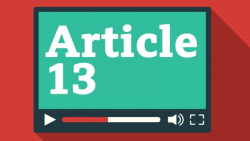My #1 life goal is to be plagiarized. THERE IS NO GREATER ACHIEVEMENT OR HONOR.
 I first wrote about the Copyright Wars in 1997, when the Digital Millennium Copyright Act was being debated.
I first wrote about the Copyright Wars in 1997, when the Digital Millennium Copyright Act was being debated.
I predicted, in my first version of Moore’s Lore, which came out in the year 2001, that “East Coast” laws like this would fall to the “West Coast Law” of code.
This is not the way things are working out in 2019. The Internet’s ability to serve mankind is threatened as a result.
As Tom Peters notes, there is no real value in an idea. An idea is only worthwhile if spreads, or if it’s acted upon. For this to happen it must be communicated, disseminated, and digested by many other people.
The Internet, specifically the World Wide Web, is the means by which this now happens. The Internet lets any idea, from anyone, reach an audience and change people. Or not.
But two things are happening. First, bad ideas are getting the same power to change people as good ideas, because no one can credibly tell everyone the difference. Second, the copyright industries have moved to stop the distribution of ideas, under the mistaken belief that there is value in them, and that anyone repeating them should pay.
Trump illustrates the first point well, although anti-vaxxers and other idiocies would exist even without him. It’s in the nature of the Internet to eliminate gatekeepers, and those companies that have risen to that position, like Facebook, Google and Twitter, eschew the role, fearing it will let government prevent protest (which it can).

An example is Article 13, recently passed by the European Parliament. Its stated purpose is to reduce copyright violations, but it considers any sharing of content, even a link like the one above, explained and described, to constitute such theft if it’s to anything with a copyright.
This directly counters the way the Web works. Google, Facebook and other scaled Internet enterprises would be held responsible for the actions of their users in violating local laws. This will cause them to stop linking to everything but other scaled user, to publishers. It would also force them to pay publishers for links, which would force them to stop explaining what it is links link to.

There’s already too much of this going around. East Coast law doesn’t just exist in law courts. It also exists in the market.
Most newspapers and magazines in the U.S. already live behind paywalls. If a story is only covered by paywalled publications, people who aren’t paying for “the content” can’t read it. This doesn’t just set us all back 25 years, but nearly a century, to the age before broadcasting.

All these paywalled publishers are demanding that, before they let readers access their online content, they buy a subscription, that they commit to spending $100 or more, over the course of a year, in order to reach the content. I can’t do it on my reporter’s pay. Even if I were to buy The New York Times, Washington Post, Business Insider, The Wall Street Journal, and my local paper, I’m paying $500 or more and getting only part of the story. What does The Financial Times say? Or the London Times? What about stories about a company that were only covered by its home town paper? Or its business paper?

There are two ways out of this, which could result in the creation of new businesses.
First, as I’ve proposed before, would be a company that offers a “day rate” for publications, and carries them all. I don’t want to buy every story in the Post, I just want the story I saw “advertised” through a link. I shouldn’t have to buy a year’s subscription to the Post in order to get that, and with a clearinghouse offering day rates I wouldn’t have to.
Second would be a library consortium, buying bulk subscriptions to every paywalled publication, which would only be accessible within library buildings. By buying one “site license” through the consortium, library patrons would not only get access to the content, but libraries would also get their business models back.

This is a model that exists, but there are many, many lazy publishers who don’t want to use it. Their laziness is self-defeating. A story that isn’t discussed, because it wasn’t read, might as well not exist. Publishers don’t understand what Peters is talking about at the top of this piece. Which is, as Wilde said, that there is one thing worse than being talked about, and that is not being talked about.

This, too, is self-defeating, because as the value of the resource declines, it becomes ever-easier for people to oppose the resource’s existence.
Forty years ago, when oil companies were threatened by public policy, they fought back. They won power to control and direct future events. If the Cloud Czars don’t do the same, right now, they’re going to lose most of the $4 trillion in market cap their risk-taking won for them this decade.
The loss for the rest of us will be far worse.











“Article 13, recently passed by the European Parliament” doesn’t apply to me. I’m American and not under their rule. We shot some Brits for similar a couple of hundred years ago.
Paywalls… ugh. Well, paywall your site. I’ll just go read elsewhere and /perhaps/ I get the viewpoint for which you want my money but odds are I’ll get something else.
Kind of screws up the whole “control the narrative” thing, eh?
And no, I’m not disabling my ad-blocker OR allowing 3rd party cookies.
“Article 13, recently passed by the European Parliament” doesn’t apply to me. I’m American and not under their rule. We shot some Brits for similar a couple of hundred years ago.
Paywalls… ugh. Well, paywall your site. I’ll just go read elsewhere and /perhaps/ I get the viewpoint for which you want my money but odds are I’ll get something else.
Kind of screws up the whole “control the narrative” thing, eh?
And no, I’m not disabling my ad-blocker OR allowing 3rd party cookies.
Yes i totally agree with without copy and paste my contribution will not be shared or my knowledge To me this Articles is not Apply to me But we are Kenyans Keep it And my Quotes s Tom Peters notes, there is no real value in an idea. An idea is only worthwhile if spreads, or if it’s acted upon. For this to happen it must be communicated, disseminated, and digested by many other people. is
Yes i totally agree with without copy and paste my contribution will not be shared or my knowledge To me this Articles is not Apply to me But we are Kenyans Keep it And my Quotes s Tom Peters notes, there is no real value in an idea. An idea is only worthwhile if spreads, or if it’s acted upon. For this to happen it must be communicated, disseminated, and digested by many other people. is